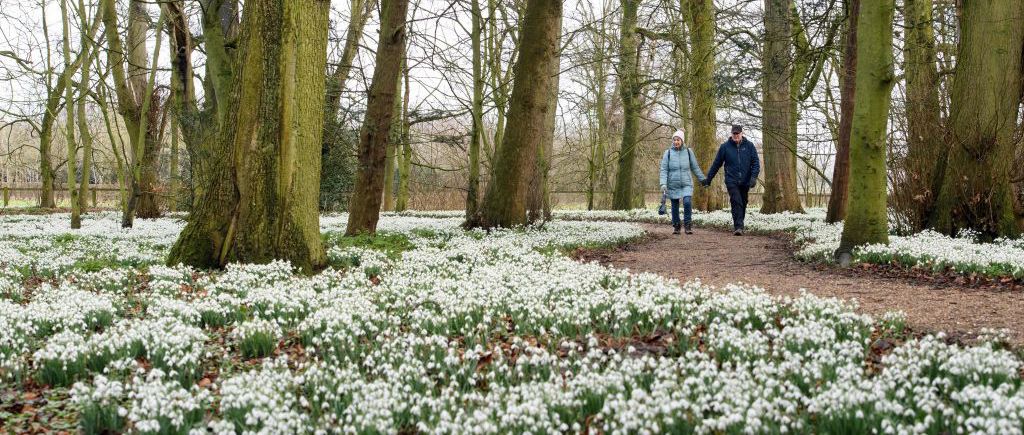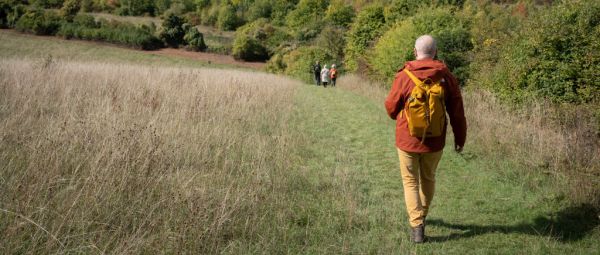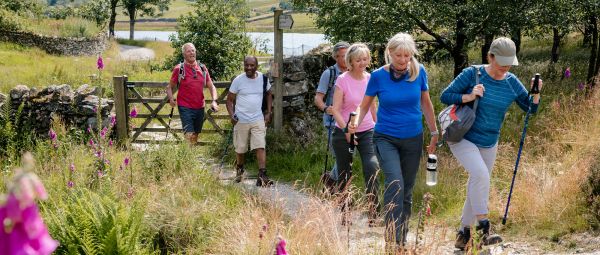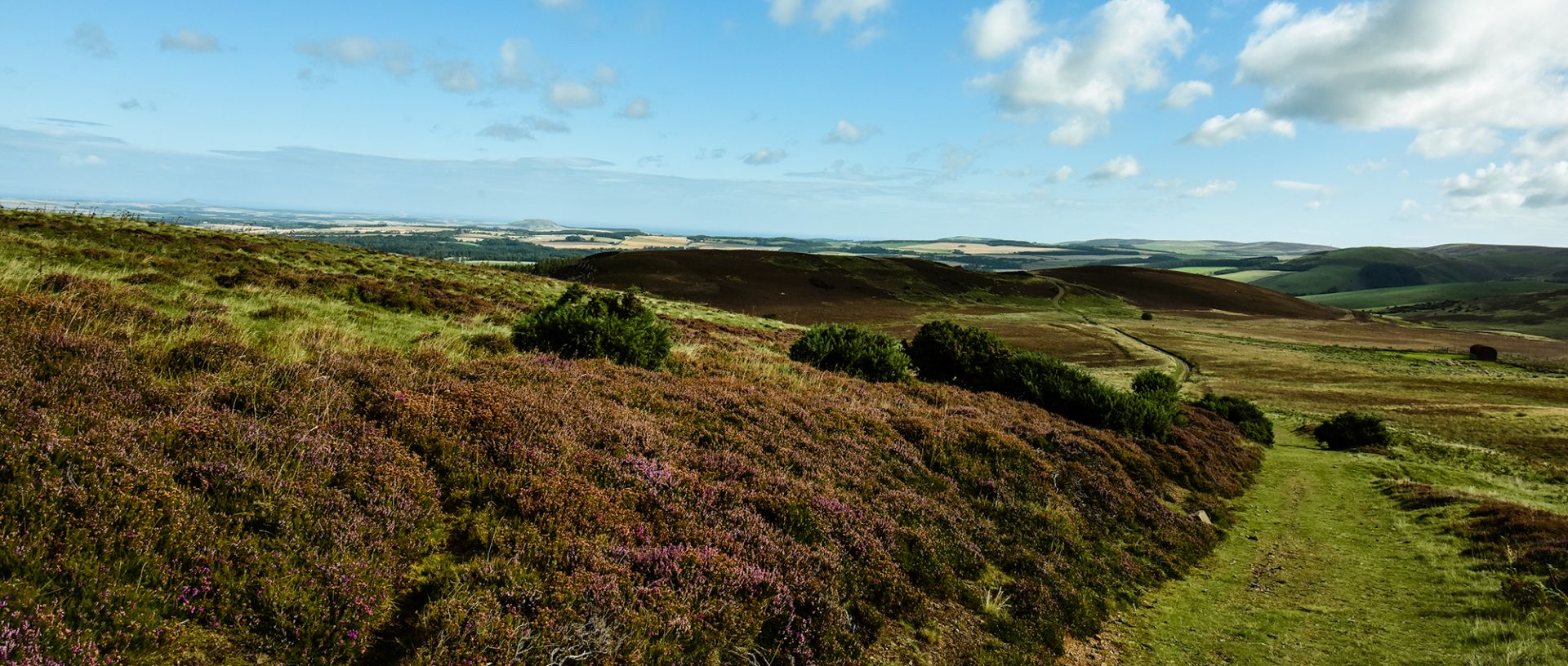How can walking improve my mental health?
Could walking help improve your mental health? We think so

Stepping outside for a walk in the open air seems such an ordinary thing. You probably do it every day, if only to pop to the shops. Yet it can have a huge impact on your wellbeing, and not just your physical health.
Clearly, at the Ramblers we’re biased. Walking always puts a big smile on our face, and we know it can do the same for everyone. But don’t just take our word for it. Science tells the same story.
Studies show that even walking briskly for ten minutes increases mental alertness and positive mood. Regular physical activity can increase self-esteem, reduce stress and lower anxiety. Exercise such as walking boosts blood flow to the muscles and brain, helping us feel energised.
Unsurprisingly, it can also help ward off mental health problems. And it’s even better outdoors. Research suggests that physical activity in a ‘green’ environment has greater positive effects. More than two-thirds of people surveyed for the Ramblers in 2020 reported that green spaces help with their mental wellbeing.
“Being out in the fresh air makes me feel great,” says Ramblers member Kandra. “It gives me a sense of wellbeing that is hard to describe.”

How does walking help address mental health problems?
Even moderate physical activity makes us feel better, so walking is a natural mood-booster. Regular activity has been shown to reduce your risk of becoming depressed by nearly a third. In fact, it can be as effective as antidepressants or psychotherapy in treating some people. And doing regular low-intensity aerobic exercise is an ideal way of increasing positive moods. It can also help reduce anxiety and improve self-esteem in people of all ages.
How does the magic of walking work? Well, for one thing it releases endorphins, so-called ‘feel-good’ chemicals produced by our brain. These help promote relaxation and improve wellbeing.
“After I have been on a walk, I come home happy,” explains Ramblers member Les. “I’m looking forward to the next one.”
The great thing about walking for wellness is that the more you do it, the better you feel. For example, try walking for at least half an hour, three or more days a week for ten-plus weeks. Regular activity can boost energy, concentration and memory, according to research by the British Heart Foundation. It’s also been linked to protection against dementia.
Feeling stressed? Walking could be part of the answer to that as well. Research on employed adults has found that highly active people tend to have lower stress rates than less-active individuals.
“Walking really does reduce stress levels when you’ve had to spend a lot of time indoors,” agrees Ramblers Chair Rebecca Dawson. “Just hearing the rustle of the leaves of the trees or birdsong, or getting fresh air in your lungs, can make a big difference.”
Trouble sleeping? Regular exercise can help improve sleep patterns, too, especially if you struggle to snooze through the night. The repeated left-right action of moving your legs provides what’s called bilateral stimuli. So walking can also help clear your mind and enable you to think.

How can I get started?
The UK’s Chief Medical Officers recommend that adults should do at least 150 minutes of moderate physical activity such as walking each week. That doesn’t mean you have to hike for hours at a time, though. Even one 10-minute daily walk is beneficial. Better still, treat yourself to a brisk 30-minute walk on five days each week. (A ‘brisk’ walking pace is about 3 miles per hour.)
If you’re not used to walking, start gently
Wear comfy shoes, set out at an easy pace for 10 minutes, and keep it short. That way you’re more likely to enjoy it, and to try walking again soon. Work out a route that suits your fitness, and gradually extend the distance you walk over the following days and weeks. When you can keep going for over half an hour and enjoy it, pat yourself on the back. It’s working!
You don’t have to go far to find a great place to walk. Immersing yourself in nature, heading for hills and woods, is great. Studies show that spending just two hours a week in places such as woodlands and fields helps people feel healthier and happier. But even a stroll in an urban park or green space can improve your connections with your local community, helping boost your wellbeing.
What are the benefits of walking in a group?
Of course, you can walk by yourself. If you find it hard to stay motivated during a stroll, try listening to music or a podcast. But another great way to enjoy all the physical and mental benefits, while also enjoying a bit of socialising, is to join a guided group walk.
If you are new to walking, we have a network of health walk groups across England that could be just right for you. There’s at least one planned walk each week with every group, starting at the same time and place. There’s bound to be one of these short ambles near you wherever you live in England. Each is led by an experienced Ramblers Wellbeing Walk leader along a tried-and-tested route. They all cover easy terrain and go at a steady pace to suit everyone. The group stays together during the walk, so you don’t need to worry about being left behind. They’re short, starting at 30 minutes and never longer than 90 minutes. You can be sure of the warmest of welcomes, too!
Find your local Ramblers Wellbeing Walks Group on our website, where there’s also helpful advice and more information about walking for mental health.
Walking in a group for experienced walkers
If you already enjoy longer walks, why not join a Ramblers group walk. With 500 Ramblers groups across England, Scotland and Wales there’s bound to be one nearby. Not only does ambling with friends or in a group bolster your motivation to keep walking, research shows that it helps reduce loneliness and social isolation. Our members certainly agree that’s true.
“I can honestly say that joining the group has been instrumental in integrating self-care, and building in time for my own mental health,” says Ramblers member Lisa Marie. “It’s given me a community of people of a similar age who say ‘YES!’ to life and adventure.”
“I call it ‘walking therapy’ as it helps clear your mind,” adds Helen, another Ramblers member. “I’ve made new friends, and it’s nice to walk and talk together, but you can also walk without chatting for a while if you need some quiet time.”
Find your nearest Ramblers group and choose a walk that suits your pace, fitness and interests.
All images © Getty

How walking can boost your health
Discover how walking can reward you with huge health benefits including a boost in mood. And it’s fun!

Getting started with walking
Our Wellbeing Walks make getting active easier, for everyone. Because you’ll be walking with others, you’ll feel safe, be supported, and have fun along the way.

10 great British pub walks
Work up an appetite and a thirst with these gentle walks visiting some of Britain’s most memorable pubs.

Campaign with us
We campaign to remove barriers to walking and we step up to protect the places we love to wander.